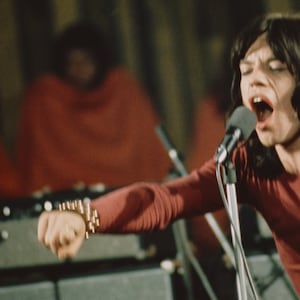You might know that the Rolling Stone who led the sanest, healthiest life would be the first to go. (Before you throw Brian Jones at me, need I remind you that technically he was no longer a Rolling Stone at the time of his untimely death?) But then life is never simple or fair. Otherwise how would a mild-mannered gentleman like Charlie Watts, who loved jazz above all, become the greatest rock drummer who ever lived?
This is not simply a matter of his playing in The World’s Greatest Rock and Roll Band, ergo… No, Charlie Watts earned the appellation all on his own. Because frankly, even when the Stones lost sight of who they were, he was always there to steer them back to sanity.
No one, for example, would ever suggest that Their Satanic Majesties Request is a great or even very good Stones record. But the other night I was watching some movie that used “She’s a Rainbow” on its soundtrack, and I found myself thinking, it’s the drumming that saves this song. It’s not an isolated instance.
On the 1970 live album Get Yer Ya-Ya’s Out! Mick Jagger gives that famous shout-out, “Charlie’s good tonight, ain’t he?” And that’s unarguable, but the truth is, Charlie was good every night.
A more revealing compliment can be found in that album’s cover, which features Watts alone (OK, in the company of a mule, bedecked with “jewels and binoculars,” which has to be one of the most obscure and certainly weirdest Dylan references ever). Surely this solo shot says everything about how his bandmates, not exactly shrinking violets, felt about him.
As they should, because as Mike Edison points out in his marvelous Watts biography, Sympathy for the Drummer, anyone else in the band could have an off night and audiences didn’t seem to mind much. Mick and Keith were allowed their frailties. But: “If Charlie missed a beat or came down missing the ‘one,’ everyone in the house would know it. If the drums stopped, it would be a disaster, the Walls of Jericho tumbling down.”
Not that we ever got the chance to put that conjecture to the test, since night after night, decade upon decade, Charlie was there, the still center of a turning world, holding things together.
What this sleights, of course, is that what made the Stones so great was not individual virtuosity but their ability to mesh as a band. And while much has been written about how the band achieved their sound, no one ever came closer than ex-Stones bass player Bill Wyman: “Something happens when we play together. It’s impossible to copy. Every band follows the drummer. We don’t follow Charlie. Charlie follows Keith. So the drums are very slightly behind Keith. It’s only fractional. Seconds. Minuscule. And I tend to play ahead. It’s got a sort of wobble. It’s dangerous because it can fall apart at any minute.”
Keith Richards saw it a little differently: “Charlie Watts has always been the bed I lie on musically.”
Another word for what Wyman was talking about is swing, an ineffable quality more associated with jazz than rock, a sort of push-pull almost Zen state that’s easy to recognize and hard to define. It’s what keeps a song airborne. Charlie Watts had swing to spare.
He was no angel but close. In the ’80s, he had a dalliance with addiction to both drugs and alcohol but quickly sobered up. Likewise, in a business where romance and lasting relationships are too often the first casualty, he remained faithful to the same wife his whole adult life. And once he escaped the ’60s, he displayed impeccable taste in clothes.

Ronnie Wood, singer Mick Jagger, musicians Charlie Watts and Keith Richards of The Rolling Stones perform during Desert Trip at the Empire Polo Field on October 14, 2016, in Indio, California.
Kevin Winter/GettyImpeccable taste in music too. Where other star drummers buried themselves behind drum kits the size of houses, Charlie Watts kept things simple. The only drummer the Stones ever had (which makes them the World’s Luckiest Rock and Roll Band), he eschewed all flash, never soloed, and settled instead for always being at the right place at the right time, serving the song, not his ego.
Mike Edison closes his biography with these shrewd words: “What’s important is that even when the Rolling Stones were playing Roman Coliseums and Mick was humping a giant inflatable penis or singing from atop a hydraulic cherry picker, when Keith was wasted and Ronnie was close behind, Charlie kicked everyone’s ass on his tiny jazz drum kit. He sold the song and looked good while doing it. And this is why Charlie Watts Matters: you could always count on him to class up the joint. You could always count on him to swing.”
The Stones fired Brian Jones and forged on. Mick Taylor departed and then so did Bill Wyman. The Stones were still the Stones, which is to say, they did not seem diminished by the losses. Losing Charlie Watts is something altogether different. I’m not sure you can come back from that. I’m not even sure you should try. Weeks ago, the band announced that Charlie would miss the upcoming tour and that Steve Jordan would hold down the drummer’s chair. Now Jordan is a wonderful musician and he would have done fine as a temporary replacement. But truly there is no replacing Charlie in any permanent sense. Without him there is no Rolling Stones, a fact acknowledged eloquently by Keith Richards who on his Instagram feed just posted a photograph showing a “Closed” sign hanging from Charlie Watts’ drum set. The greatest tribute his bandmates could pay him would be to declare that they’re done. I just hope they have that much class. No man deserved it more.

